What's the difference between a crossover, SUV and 4x4?
SUVs and crossovers are a hit with customers, but what’s the difference between them and a traditional 4x4?
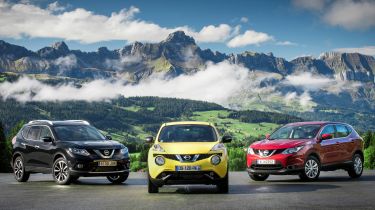
Sales of high-riding crossovers, SUVs and 4x4s have shot up dramatically in the past decade. Compare 2016 sales to those from 2006 and there’s been a 149% increase according to the Society of Motoring Manufacturers (SMMT). That’s second only to the rise in city car sales.
While tough 4x4s were once bought mostly by farmers and off-road enthusiasts, their modern equivalents are snapped up by anyone looking for a safe, practical and stylish family car. Most customers have migrated from saloon cars – which have dropped in popularity by 35% in 10 years – and even sports cars. But customers can also be swayed from buying a new family hatchback or even a supermini.
A big part of the sales surge has been made possible by a new breed of crossovers with lower running costs, and in this guide we’ll explain the main differences between a crossover, an SUV and a traditional 4x4.
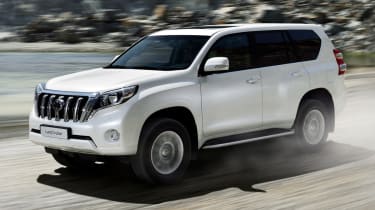
What is a 4x4?
Before we get on to the latest breed of SUVs and crossovers, it’s important to understand where the trend first started. So-called 4x4s simply got their name from the fact all four wheels were driven by the engine to get them almost anywhere. Rather like a modern horse-drawn carriage, traditional 4x4s use a rugged chassis frame, which the bodywork is sat on top of and bolted in place.
This makes 4x4s heavy and doesn’t offer the most precise handling, but on the other hand it makes them exceptionally tough and good at towing heavy trailers. This simple engineering was also favoured by manufacturers, because different bodywork could be bolted on to the same four-wheel-drive chassis, giving you the choice of a smart passenger model, pickup truck or even a military version. While it’s no longer in production, the Land Rover Defender is the most famous example of this approach, with hundreds of versions spanning from soft-tops to ambulances and fire engines.
Popular 4x4s on sale today include the Mitsubishi Shogun, Jeep Wrangler, Mercedes G-Class, SsangYong Rexton and Toyota Land Cruiser. It should come as no surprise these are also among the top models favoured by off-road experts and modern-day adventurers.
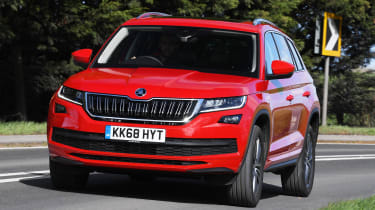
What is an SUV?
The term Sports Utility Vehicle (SUV) came about to describe stylish, high-riding vehicles intended to have better road manners, lower running costs and improved luxury and comfort for the driver and passengers than 4x4s. From an engineering standpoint, the main change is that the bodywork and chassis form one complete piece, saving weight and making an SUV much more rigid.
For this reason, an SUV can be more engaging and car-like to drive – after all, they share cars’ construction methods. Their crash-test results are also greatly improved by more effective crumple zones, distributing the energy of a collision in a safer way.
Less weight and smaller engines mean better fuel economy and lower tailpipe emissions, bringing down running costs and making SUVs more accessible to a wider number of owners
Indeed, the sheer range of SUVs on offer means there’s something for almost every driver and budget, from the Mazda CX-5 that’s a great family car with sharp handling to the Range Rover that can conquer almost any landscape, but is now more likely to be spotted outside a five-star hotel.
Our favourite SUVs include models like the Skoda Kodiaq, Nissan X-Trail, Kia Sorento, Renault Koleos and Land Rover Discovery – many of which offer seven seats.
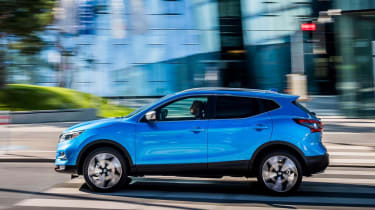
What is a crossover?
You’ve no doubt heard about the rising popularity of crossovers, and might be thinking of buying one, or have already taken the plunge. So, what is a crossover? Well, the lines aren’t always crystal-clear, but a crossover has more in common with a tall, rugged-looking family hatchback than a traditional 4x4. The Nissan Qashqai is widely credited for kicking off the crossover craze, leading other manufacturers to design their own as it sold in huge numbers.
A crossover might have tough looks, chunky bumpers and raised ground clearance, but power typically goes to just the front wheels and is produced by the same engines designed for other hatchbacks and superminis you’ll find in the showroom. The genius of this is that families can enjoy much of the same style, practicality and robustness of a 4x4 or large SUV, but the driving experience, running costs and technology of a Volkswagen Golf-sized car.
While a 4x4 might return fuel economy of 30 to 40mpg and an SUV can manage 40 to 50mpg, most crossovers can achieve more than 60mpg. Low CO2 emissions are also attractive for company-car drivers, because their monthly Benefit-in-Kind (BiK) tax bill will be far lower than if they choose a 4x4.
Power is usually provided by a small turbocharged petrol or diesel engine, with sizes varying from 1.0 to 2.0 litres. It’s also possible to choose a hybrid model like the Toyota C-HR or Kia Niro, while the plug-in hybrid MINI Countryman even offers zero-emissions driving for up to 26 miles.
Making the definition somewhat trickier, crossovers also span two classes, with the larger of the two including models similar to a family hatchback in size, like the Peugeot 3008, SEAT Ateca, Nissan Qashqai, Skoda Karoq and Mazda CX-5, to name just a few.
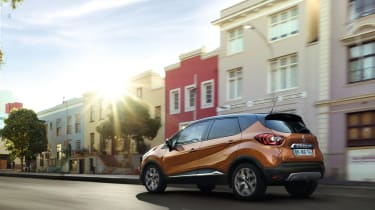
There’s also a growing number of supermini-sized crossovers, a class pioneered by the quirky Nissan Juke. It has been joined by the popular Renault Captur, Peugeot 2008, Vauxhall Mokka X, Citroen C4 Cactus and Mazda CX-3. Even Ford has got in on the small crossover trend, first with the Ford EcoSport and now with the Ford Fiesta Active, based on Britain’s best-selling supermini.
Most Popular
Tips & advice

Car dashboard warning lights: what does each symbol mean?

Electric car charging stations: public networks, charger types, apps and maps






